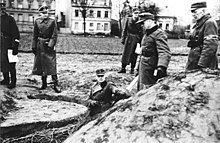Helmuth Reymann
| Hellmuth Reymann | |
|---|---|

Hellmuth Reymann in 1945
|
|
| Born | 24 November 1892 |
| Died | 8 December 1988 (aged 96) |
| Allegiance |
|
| Service/branch | Army |
| Rank | Generalleutnant |
| Commands held | 11. Infanterie-Division |
| Battles/wars | World War II |
| Awards | Knight's Cross of the Iron Cross with Oak Leaves |
Hellmuth Reymann (24 November 1892 – 8 December 1988) was an officer in the German Army (Heer) during World War II. Reymann was one of the last commanders of the Berlin Defense Area during the final assault by Soviet forces on the city of Berlin.
From 1 October 1942 to 1 October 1943, Reymann commanded the 212th Infantry Division as part of Army Group North. From 1 October 1943 to 1 April 1944, he commanded the 13th Air Force Field Division. Reymann's division suffered heavy losses in the retreat from Leningrad and was disbanded in April 1944. From 1 April 1944 to 18 November 1944, Reymann commanded the 11th Infantry Division. In October 1944, Reymann's division was encircled in the Courland Pocket and he was replaced by General Gerhard Feyerabend.
In March 1945, Reymann was appointed commander of the Berlin Defense Area, replacing General Bruno Ritter von Hauenschild. When he entered Berlin, Reymann found that he had inherited almost nothing from his predecessor, von Hauenschild. Reymann realized that Hitler and Joseph Goebbels had ruled that any defeatist talk would lead to immediate execution. No plans were drawn up to evacuate the civilian population which remained in the city.
By 21 April, Joseph Goebbels, as Reich Commissioner for Berlin, ordered that "no man capable of bearing arms may leave Berlin". Only Reymann, as commander of the Berlin Defense Area, could issue an exemption. Senior Nazi Party officials, who readily condemned members of the army for retreating, rushed to Reymann's headquarters for the necessary authorizations to leave. Reymann was happy to sign over 2,000 passes to get rid of the "armchair warriors". Reymann's Chief-of-Staff, Hans Refior, commented: "The rats are leaving the sinking ship".
Both Wilhelm Burgdorf and Goebbels convinced Hitler that Reymann should be relieved of command. When Reymann chose not to locate his office next to Goebbels' office in the Zoo Tower, Goebbels held this act against him. On 22 April, Hitler relieved Reymann of his command for his defeatism and replaced him with newly promoted Major-General Ernst Kaether. Kaether was the former Chief-of-Staff to the chief political commissar of the German Army (Heer). But, Kaether never took command and his orders were cancelled the next day. The result of all of this was that, when the first Soviet Army units entered the suburbs of Berlin, there was no German commander to coordinate the city's defenses.
...
Wikipedia
